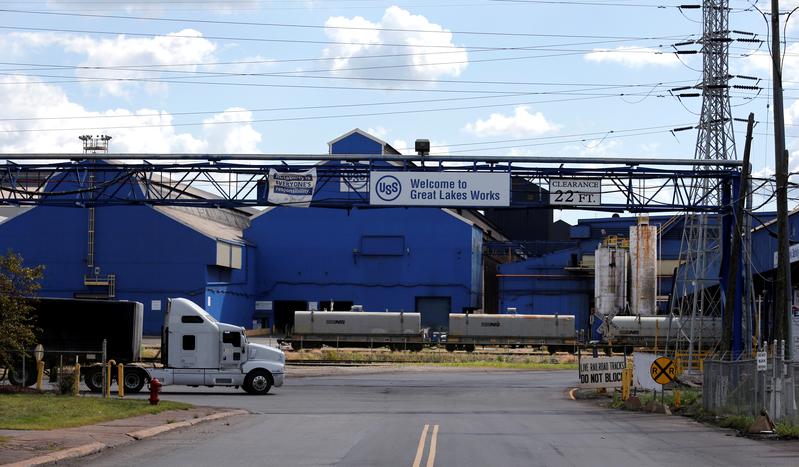
President Donald Trump promised a new dawn for the struggling U.S. steel industry in 2016, and the lure of new jobs in Midwestern states including Michigan helped him eke out a surprise election win.
Four years later, Great Lakes Works – once among the state’s largest steel plants – has shut down steelmaking operations and put 1,250 workers out of a job. A year before the June layoffs, plant owner United States Steel Corp called off a plan to invest $600 million in upgrades amid deteriorating market conditions.
Trump’s strategy centered on shielding U.S. steel mills from foreign competition with a 25% tariff imposed in March 2018. He also promised to boost steel demand through major investments in roads, bridges and other infrastructure.
But higher steel prices resulting from the tariffs dented demand from the Michigan-based U.S. auto industry and other steel consumers. And the Trump administration has never followed through on an infrastructure plan.
Michigan’s heavy reliance on the steel and auto industries puts Trump’s trade policy in sharp focus ahead of the Nov. 3 presidential election in this battleground state. Democrats say they aim to recapture the votes of blue-collar workers they lost to Trump four years ago – one key factor in his victory over Hillary Clinton. Trump won Michigan by less than one percent of the statewide vote total. The competition for the votes of often-unionized manufacturing workers – who historically have voted Democratic – will be just as fierce in the battleground states of Wisconsin and Pennsylvania, political analysts say.
Biden leads Trump in Michigan by 8 percentage points, according to a Reuters/Ipsos state opinion poll of likely voters conducted from Sept. 29 – Oct. 6, widening his lead from a few weeks earlier.
Nationally, the steel industry has been shedding jobs for the past year – since before the wider economic downturn caused by the COVID-19 pandemic – and now employs 1,900 fewer workers than it did when Trump took office, according to U.S. Labor Department data. (For a graphic on steel jobs, click tmsnrt.rs/2SRIEaF)
While the tariffs failed to boost overall steel employment, economists say they created higher costs for major steel consumers – killing jobs at companies including Detroit-based automakers General Motors Co and Ford Motor Co. Nationally, steel and aluminum tariffs resulted in at least 75,000 job losses in metal-using industries by the end of last year, according to an analysis by Lydia Cox, a Ph.D. candidate in economics at Harvard University, and Kadee Russ, an economics professor at the University of California, Davis. In all, they estimated, the trade war had caused a net loss of 175,000 U.S. manufacturing jobs by mid-2019.
Read more…
@reuters.com




